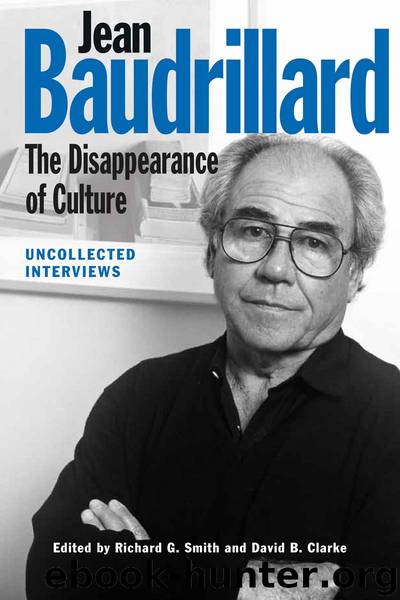Jean Baudrillard: The Disappearance of Culture: Uncollected Interviews by Richard G. Smith

Author:Richard G. Smith [Smith, Richard G.]
Language: eng
Format: epub
Tags: Philosophy, General
ISBN: 9781474417808
Google: ZjZYDwAAQBAJ
Publisher: Edinburgh University Press
Published: 2017-04-28T01:11:01.162000+00:00
13 Viral and Metaleptic
Interview with Pierre Boncenne (PB)
PB Recently, Le Monde published an article on the progress of digital technologies, entitled ‘The boundaries between the virtual and reality are increasingly blurred’. Wouldn’t someone who’d read you overhastily be inclined to take that for a Baudrillard title?
It’s amusing to start there because in fact I’ve never said that – at least not in those terms. The idea that reality no longer exists is, as I see it, a hypothesis. And it’s to be understood in that sense only. But it’s useless to try to re-establish any kind of truth since we are, by definition, in a world where it no longer exists . . .
PB Thirty years ago, in your first books, you often used the notion of ‘sign’, which has subsequently almost become a cliché.
A total cliché. And I’ve had absurdities of the ‘Signs-are-all-there-is!’ type lumped on me. Later, more or less the same thing happened to me with ‘simulation’: American artists hardened up the hypothesis to the point where it became set in stone. After that, it’s impossible to pull these things back. But, again, let’s leave it there. That’s just how it goes.
PB In Cool Memories, a melancholy series of fragments, mid-way between essay and diary, you slipped in this personal admission, which is a sort of clarification: ‘The immateriality of signs is alien to me, as it is to a race of peasants with whom I share an obsessional morality, a sluggishness, a stupid, ancestral belief in the real. In reality, I am one of them.’
My parents were in fact of peasant origin. They came from the Ardennes and settled in Reims. From that peasant background, I’ve retained something of a barbarian bias against culture. Contrary to appearances, I’m not greatly at ease manipulating sign systems. All the themes I’ve latched on to over the years – the immateriality of signs, simulation, seduction – weren’t part of my calling. Even on the subject of death, I have very little imagination. But there is this something impenetrable deep down in me, this drive that leads me to be fascinated by things that will always be beyond my grasp. At that point, I try to make utopias of them – or objects of analysis.
PB It was in that sense that you were fascinated, if not indeed bowled over, by America?
Yes, of course. It’s clearly not a world I could live in. Apart from the desert, where I feel affinities because there isn’t any antinomy there between the primal environment and the sense of nothingness, of emptiness. I went back to California last spring. There wasn’t the same feeling of illumination and astonishment as when I first discovered the place – that quasi-physical metabolic effect that led me to steep myself in America. But whether through the natural spectacle of the imposing landscapes, the technology or the culture, I re-discovered my phantasmagorias there. Perhaps because I’ve never lost my childlike curiosity and I’ve never been blasé, I always find the
Download
This site does not store any files on its server. We only index and link to content provided by other sites. Please contact the content providers to delete copyright contents if any and email us, we'll remove relevant links or contents immediately.
The remains of the day by Kazuo Ishiguro(8350)
Tools of Titans by Timothy Ferriss(7758)
Giovanni's Room by James Baldwin(6770)
The Black Swan by Nassim Nicholas Taleb(6732)
Inner Engineering: A Yogi's Guide to Joy by Sadhguru(6418)
The Way of Zen by Alan W. Watts(6264)
Asking the Right Questions: A Guide to Critical Thinking by M. Neil Browne & Stuart M. Keeley(5328)
The Power of Now: A Guide to Spiritual Enlightenment by Eckhart Tolle(5307)
The Six Wives Of Henry VIII (WOMEN IN HISTORY) by Fraser Antonia(5206)
Astrophysics for People in a Hurry by Neil DeGrasse Tyson(4981)
12 Rules for Life by Jordan B. Peterson(4151)
Housekeeping by Marilynne Robinson(4036)
The Ethical Slut by Janet W. Hardy(4019)
Skin in the Game by Nassim Nicholas Taleb(3951)
Double Down (Diary of a Wimpy Kid Book 11) by Jeff Kinney(3890)
Ikigai by Héctor García & Francesc Miralles(3846)
The Art of Happiness by The Dalai Lama(3829)
Skin in the Game: Hidden Asymmetries in Daily Life by Nassim Nicholas Taleb(3707)
Walking by Henry David Thoreau(3667)
